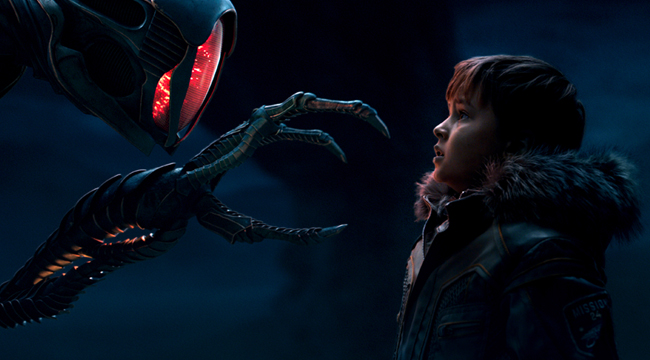
Growing up, there were shows from before my time that I got to experience directly, and ones I more or less absorbed through pop culture osmosis. The original Star Trek was in constant rerun syndication, so I saw every episode, usually multiple times (even “Spock’s Brain”). Lost in Space, whose run largely overlapped Trek‘s, wasn’t as readily available, yet comedians and talk show hosts made so many references to it that I felt as if I had seen some of it, even though I hadn’t. At a minimum, I knew that it was about a family on a voyage through the stars, that the son was a child prodigy whom some viewers loved and others found annoying, and that Dr. Smith kept causing trouble for the family yet never got kicked off the ship.
Mostly, though, I knew that there was a robot whose primary job was to protect the ship’s youngest crewmember, usually with metallic warning cries of, “DANGER, WILL ROBINSON!”
The Robinsons haven’t had the enduring legacy of Kirk, Spock, and McCoy, but the name Lost in Space has held onto just enough currency to inspire an unsuccessful movie adaptation in 1998 (starring past and future Oscar winners William Hurt and Gary Oldman, no less), and now to a big-budget Netflix series debuting Friday.
And, once again, the part most likely to be remembered is the robot.
The new Robot really is a marvel of design, both physically and creatively. It’s an extra-terrestrial machine, discovered by Will (Maxwell Jenkins) when the family’s ship crashes on a planet in a distant galaxy, and it looks and feels very much like something not of our world. Its default configuration looks humanoid, albeit with an oval screen projecting inscrutable multi-colored light where a face would be, but it can sprout multiple limbs and shift its bearing to be more animal, or monster, than man. Narratively, the model is less the original Robot (or the one from the movie, though the series borrows a number of elements from it, starting with the Robinsons leaving Earth because it’s on the verge of becoming uninhabitable) than Iron Giant, with Robot designed for one purpose but growing tame and kind under the care of the boy who finds him in the woods. Through the six episodes I watched (out of all 10 screeners provided), the Robot barely speaks, and only to recite its most famous catchphrase, but is so physically expressive that no other words are necessary.
It’s when the human characters start speaking that Lost in Space is much less exciting. Our parents this time out are career soldier John Robinson (Toby Stephens) and polymath scientist Maureen (Molly Parker), along with kids Will, middle child Penny (Mina Sundwall), and oldest daughter Judy (Taylor Russell), who’s even more of a genius than half-sibling Will in this version. Screenwriters Matt Sazama and Burk Sharpless (Dracula Untold), working with TV veteran Zack Estrin (Prison Break), have fallen into the trap of too many family-oriented projects by trying to be relatable to everyone and winding up with little likely to excite anyone. There’s some vaguely interesting tension baked into the Robinson marriage, as John and Maureen vie for alpha parent status, while the kids (who’ve been around mom much more than dad) naturally gravitate towards her, but that’s not enough to carry an entire series, especially since the kids range from blandly helpful (Judy) to blandly sarcastic (Penny).
Dr. Smith and the original series’ heroic pilot Don West have both been reconceptualized: Smith as a sociopath con woman played by Parker Posey, West as a blue-collar crewmember and smuggler played by Ignacio Serricchio. Smith’s new backstory is perhaps meant to justify her continued presence better than the original show is remembered for doing with its Smith, but it’s a fairly one-note character with whom even the great Posey can only do so much, especially with the same mendacious beats repeated over and over again.
This is the problem with the new series as a whole. It suffers from all of the flaws of Netflix’s “It’s really a 10-hour movie” approach, without even having the early forward momentum or engaging enough characters to compensate. There are some nice action sequences, particularly in the opening two episodes, directed by Game of Thrones‘ Neil Marshall, and the series as a whole looks great, convincingly transforming the wilds outside Vancouver into something that feels genuinely alien. But outside of everyone’s complicated relationship with the Robot (and even that’s a very slow burn), there’s just not enough there in the story or characters that feels distinctive or compelling enough to keep going. One critic even assured (threatened?) me that It Gets Good By The Second Half, but the first half was too generic to justify continuing.
Lost in Space is one of those titles, and concepts, that has so seeped into the fabric of our TV history, we’re likely to see periodic remakes for decades to come, long after everyone’s gone who might have even heard about the original, let alone seen it. There will always be a family, always be a treacherous character called Smith, and always a robot. Hopefully, future versions do better with the family and Smith, though they’ll have a hard time topping this Robot.
Alan Sepinwall may be reached at sepinwall@uproxx.com. He discusses television weekly on the TV Avalanche podcast. His new book, Breaking Bad 101, is on sale now.
